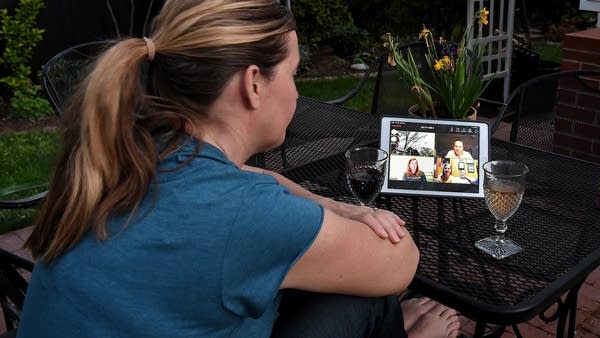A new episode from APM’s mental health initiative “Call to Mind” explores how loneliness affects mental and physical health, and how meeting an online community offline can help.

The COVID-19 pandemic forced a lot of us to stay at home without the chance to socialize in person. But technology allowed us to stay in touch. Social media platforms helped connect us with the outside world — there was Zoom and Houseparty, and remember Clubhouse?
But many Americans still struggle with loneliness, even now as life has somewhat returned to normal. Younger Americans are twice as likely to feel lonely than seniors, according to research from Cigna.
Marketplace’s Lily Jamali spoke with Kimberly Adams, senior correspondent at Marketplace and host of American Public Media’s series “Call to Mind.”
In a recent episode of that show, she explored what role technology plays in people’s lives when they’re struggling with loneliness. Adams said loneliness is something researchers have been looking into for decades, way before the pandemic. The following is an edited transcript of their conversation.
Kimberly Adams: For some people, going to work or going to school and interacting with people and having that sense of community there, that was the only social connection that they had. And so when that was taken away and moved virtually, that did some harm to some people. And others flourished in that space and really loved that virtual environment. But what came up again and again throughout the interviews that we did for a “Call to Mind” episode on loneliness was that virtual connections are not the same as in-person, real-life connections.
Lily Jamali: And what did the experts you spoke to say about how to strike that balance?

Adams: It’s a starting point. Some experts were telling me that they prescribe online, social connections to their clients. Maybe you have somebody with social anxiety who wants to date but they’re a little nervous. And so they’ll prescribe to go on dating apps. Or maybe you have someone in the queer community who doesn’t have a safe or supportive environment where they are. And so they’ll go online to find that sense of community. But it’s really important that those online relationships at some point translate into in-person connections to get those health benefits.
Jamali: Really struck by some research out from Cigna, the health insurance company, that shows younger Americans are more likely to feel lonely than older Americans. Does that line up with what you found in your reporting?
Adams: Absolutely, and some of these health professionals were really surprised and very alarmed by the rise in loneliness amongst younger people, especially because often younger people will have extremely large online communities through social media, maybe through gaming or through any kind of app you can think of. But they’re investing so much time in online relationships that sometimes it can actually harm their in-person relationships. One of the experts we talked to was Dr. Elias Aboujaoude, a psychiatrist and clinical professor at Stanford University. He’s written a bunch of books and research papers on the intersection of technology and psychology. And here’s what he said about those online connections:
Elias Aboujaoude: The risk is that the person who started out feeling lonely because of a lack of real-life friends and real-life connections, that person goes online, develops some online connections, and as a result ends up spending more and more time online. And what happens in their real lives is that they’re even more isolated now and have even less offline connections, because of all the time and energy and bandwidth that they invested in their online relationships.
Adams: So, while it can be great to forge that sense of community online, that offline part of it is really key to addressing loneliness.
Jamali: What do you think big tech companies that build social media sites, these communication apps and dating apps, all of it — what should they be taking into account in future innovations that might help reduce loneliness, while all of us, whether we like it or not, exist online?
Adams: Yeah, I actually talked to several of the experts in the show about this. And they are really hoping for that nudge to get people to take those online relationships offline. Whether that maybe is a gaming platform that has an in-person meetup for players or another social group online actually planning a time to meet up, all of those things, if tech companies will give people a little bit of a nudge, that might actually translate those online groups and those social connections to real-life improvements to someone’s well-being.
Here’s a link to the Centers for Disease Control and Prevention study known as the Youth Risk Behavior Survey. The CDC conducts the survey every two years — with the most recent one in the fall of 2021 — canvassing teenagers across the country. The results are troubling, to say the least.
Almost 3 in 5 teen girls felt persistent sadness. That’s nearly twice the rate of boys, and a record for the survey, which started in 2011.
Research from Cigna also shows people from underrepresented racial groups are more likely to be lonely. According to the health insurance company, three-quarters of Hispanic adults and more than two-thirds of African Americans are classified as lonely. The national average is 58%.
And finally, make sure to check out the entire episode of APM’s “Call to Mind,” dedicated to seeking connections. Kimberly Adams looks at whether loneliness impacts a person’s mental and physical health, and whether we’re looking for social connections in the right places.